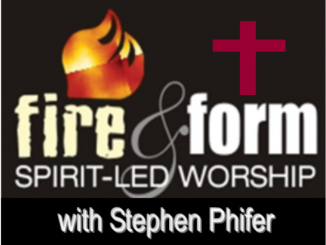Beyond the Comfort Zone: Public Worship Should Stretch the Worshiper
Introduction
The comfort zone. Each of us has one. Physically, there is a space that surrounds us that we feel is ours.  When some uninvited person invades this space, we feel crowded, uncomfortable. If possible we will retreat and reestablish the zone, our comfort zone. This zone also exists in other aspects of life. In relationships, in finances, in neighborhoods, even in our homes we establish comfort zones. Our loved ones know where the boundaries are: the subjects not to bring up, the chair not to sit in, the spending limit, the habits not to challenge. We approach these zones only with caution and at great personal risk.
When some uninvited person invades this space, we feel crowded, uncomfortable. If possible we will retreat and reestablish the zone, our comfort zone. This zone also exists in other aspects of life. In relationships, in finances, in neighborhoods, even in our homes we establish comfort zones. Our loved ones know where the boundaries are: the subjects not to bring up, the chair not to sit in, the spending limit, the habits not to challenge. We approach these zones only with caution and at great personal risk.
These comfort zones can be found in church, as well. The house of God can become such a comfortable place. We know all the people, all the songs, and we know the routine. Relationships are secure, roles well defined, and the calendar is a model of consistency. Serving Jesus is such a pleasant life.
Secure Relationship With God
Really? Has the Lord Jesus claimed us as His own, filled us with His Spirit, and called us to His Kingdom, just to establish and reinforce better comfort zones? In one sense, yes. There is a spiritual security zone maintained by the Lord. We are hemmed in by His love. “You have hedged me behind and before, and laid Your hand upon me.” (Psalm 139:5 NKJ) This zone is intended to make us secure in our relationship  with God. We can live consistent Christian lives knowing that the circumstances that confront us have to cross God’s desk first. We can face each day with confidence and we can actually take joy in trials knowing that God is at work through the circumstances we face. If the story of Job illustrates life for us, even the spiritual forces who oppose us have lines they cannot cross. Each of us lives within a Divinely ordained security zone.
with God. We can live consistent Christian lives knowing that the circumstances that confront us have to cross God’s desk first. We can face each day with confidence and we can actually take joy in trials knowing that God is at work through the circumstances we face. If the story of Job illustrates life for us, even the spiritual forces who oppose us have lines they cannot cross. Each of us lives within a Divinely ordained security zone.
But this is not the whole story. Within the protection of a divine security zone, God can allow us to be quite uncomfortable. Under this canopy of grace, the Holy Spirit often challenges us to stretch beyond the personal comfort zones we have established. In Isaiah(54:2) the Lord speaks to Israel as if she were a barren woman, “Enlarge the place of your tent, and let them stretch out the curtains of your habitations; do not spare; lengthen your cords, and strengthen your stakes.” Many of us have established our own comfort zones well within the boundaries of those God has set. How the Holy Spirit longs to shake us from our lethargy, to interrupt our routines, to invade our services and to enlarge our hearts. Why? Because, like ancient Israel, barrenness accompanies the contented community. Comfort zones isolate us from potential brothers and sisters.
Rehearsing Truth In Our Hearts
How can we “stretch out the curtains of our dwelling” ? Truth stretches us. How many years have we been studying the Bible, yet there is always a new truth, or an old truth from a new angle, or an as yet undiscovered stream of Biblical witness that stretches a familiar truth into new areas of application. As truth is rehearsed in our hearts and minds, one of the intended effects is growth in our concepts of God and His Kingdom: “stretching out the curtains” as we “enlarge the place of our tent.”
 How is truth rehearsed in our hearts? Several important ways. Bible reading, Bible study, Bible teaching, and Bible preaching spring immediately to mind. But there is another way that must take its rightful place on this list: Bible singing. When the New Testament tells us to sing psalms, we are being instructed to sing Scripture. Singing is a powerful teaching tool because the music adds an emotional element that opens the heart to the truth. Certain elements of music make memorization easier, meter, melody, and repetition. These are natural allies to the process of ingesting the truth of the song. In corporate settings the unity of all the believers singing the same truth at the same time with same emotion is vital force in the life of the church.
How is truth rehearsed in our hearts? Several important ways. Bible reading, Bible study, Bible teaching, and Bible preaching spring immediately to mind. But there is another way that must take its rightful place on this list: Bible singing. When the New Testament tells us to sing psalms, we are being instructed to sing Scripture. Singing is a powerful teaching tool because the music adds an emotional element that opens the heart to the truth. Certain elements of music make memorization easier, meter, melody, and repetition. These are natural allies to the process of ingesting the truth of the song. In corporate settings the unity of all the believers singing the same truth at the same time with same emotion is vital force in the life of the church.
Singing Scriptures
There are two types of Bible singing, 1) Scriptures set to song and 2) songs composed to express Biblical truths. To the composer, the challenges of each type of song are exciting. Setting verses of Scripture to music is a great challenge. Composing songs to express Biblical truths is a different type of challenge.
This type of singing, when approached systematically, will stretch us beyond our comfort zones. In a musical sense, singing Scripture is a challenge to the worshiper but it is worth the effort. When we learn to sing Scripture, we are hiding God’s Word in our heart. We can be assured that when we need that  truth, it will be in our hearts and on our lips as sing God’s answer for our dilemma. Complex songs with lots of words and verse challenge a congregation as well. Some choose not to use them, preferring the songs that yield an immediate return in that service. As a worship leader, I consider it worth the service time to sing an involved song of important truth often enough until it has its effect. This is worth the effort. Great theology can be infused into the hearts of God’s people through the great art of composers of today and the past.
truth, it will be in our hearts and on our lips as sing God’s answer for our dilemma. Complex songs with lots of words and verse challenge a congregation as well. Some choose not to use them, preferring the songs that yield an immediate return in that service. As a worship leader, I consider it worth the service time to sing an involved song of important truth often enough until it has its effect. This is worth the effort. Great theology can be infused into the hearts of God’s people through the great art of composers of today and the past.
Conclusion
Sometimes the technology required to use more complex songs puts some people off. Hymnals are one such technology. Some have stopped using them. Projected words (slides, transparencies, video, etc.) are another approach that some don’t care for. Song sheets are a cross between the two. Memorized singing is the alternative to such visual aids but this virtually guarantees worship within the comfort zones. We settle for less that what God has for us today. We lock ourselves away from the best of what God said through song writers of the past.
“Woe to them that are at ease in Zion”, the Prophet Amos said. One of the great signs of ease is singing on automatic pilot, where the singer doesn’t need to see the words because he has sung this song since childhood. Paul reported a balance in his worship life. “I will sing with the spirit and I will sing with the understanding.” I Cor 14. There were times when his song was a song for his spirit to sing and other times when it taxed him mentally. We need both kinds of song, also. Worship of Almighty God should release our spirits to soar in worship and challenge our minds to new concepts of God. Worship should stretch us beyond our comfort zones.
Dr. Steve Phifer received a Doctorate in Worship Studies from the Robert E. Webber Institute for Worship Studies. He has taught at Valley Forge University and Southeastern Assemblies of God University. For many years he was the Worship Pastor at Word of Life Church in Alexandria, VA.
More of Dr. Phifer’s materials can be found at stevephifer.com.
